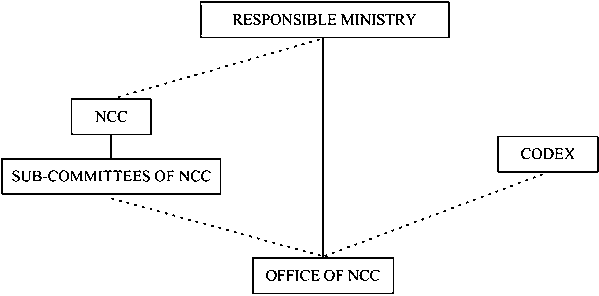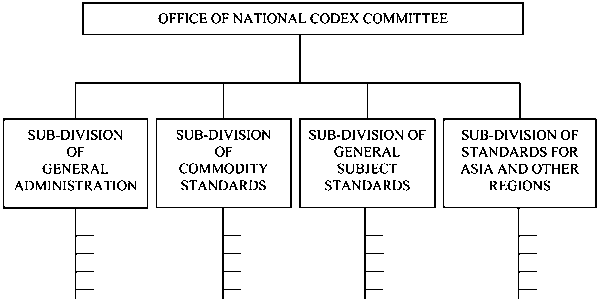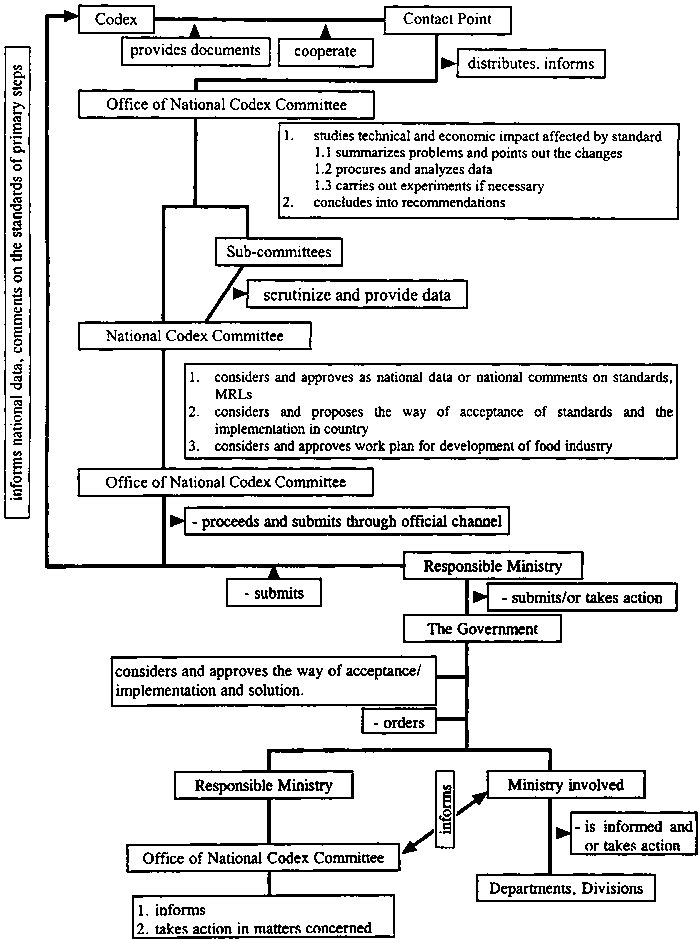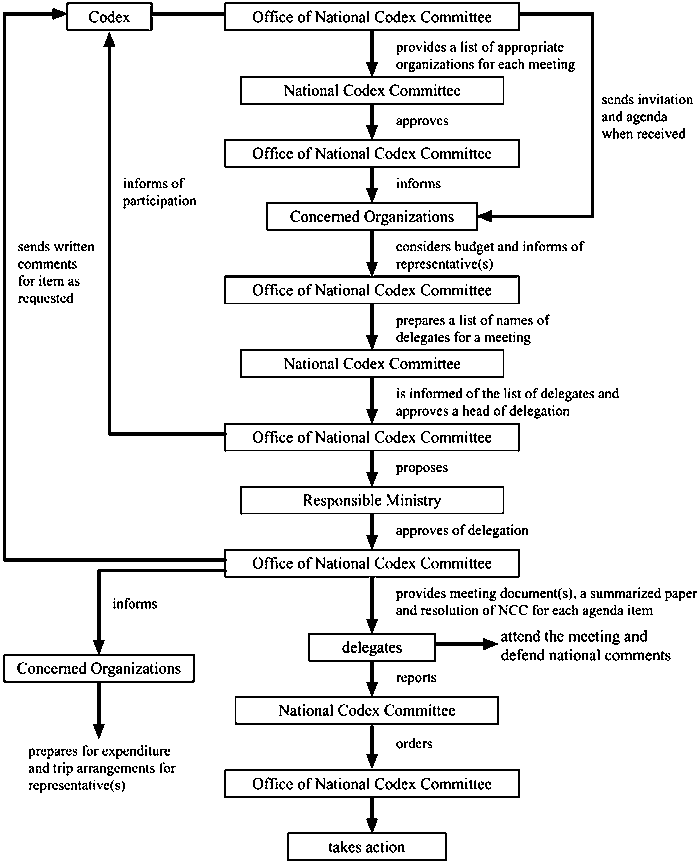Introduction
Codex Contact Points
National Codex Alimentarius Committee
Office of the National Alimentarius Codex Committee
Procedure for Codex Work
Procedure for Participating in Codex Meetings
Guideline for Distribution of Codex Documents
Other Activities
(Advanced to Step 8 of the Codex Procedure)
Standardization is a mechanism to ensure the quality products. Food standards set the requirements for products to ensure that they are safe and fit for consumption, thus providing protection of the health of consumers.
In the commercial area, standards can be used as the basis for commercial agreements. Standards enable fair practices in the exchange of goods, thus eliminating barriers to trade. International standards are necessary and are a means to facilitate trade.
Country should be fully conscious of the significance of food standards for consumers’ health, as well as for trade and we realize the necessity of international food standards of the Joint FAO/WHO Food Standards Programme for protection of the health of consumers and for ensuring fair practices in the food trade.
The following Guidelines are reference examples for establishing new Codex Contact Points and National Codex Committees. Should there be an existing organization that is functioning with the effective liaison occurring with industry and consumers, introduction of a new organization may not be necessary. However, the government may appoint such an organization as a National Codex.
Description
The need
Location
Equipment and other Requirements
Essentially a Codex Contact Point is the central coordination point for all Codex activities within a member country. It serves as the initial recipient of Codex documents, publications and other communications, maintains a library of Codex standards, codes of practice and guidelines together with associated documents and, where appropriate, initiates positive action to stimulate knowledge of and interest in the aims, objectives and work of the Codex Alimentarius Commission and its subsidiary bodies.
The Codex Contact Point works in close cooperation with the National Codex Committee, which has the responsibility to consider technical and related issues and formulate advice for government. Where such a Committee has not been established, the Codex Contact Point acts as the liaison point, with the food industry, consumers, traders and all other concerned persons or organizations, as well as the various concerned ministries, to ensure that the government is provided with an appropriate balance of policy and technical advice upon which to base decisions relating to issues raised in the context of the Codex Alimentarius Commission’s work.
In the field of communications, the Contact Point is the link between the Codex Secretariat and member countries, the various concerned ministries within each member country, private sector groups such as food industry and consumer organizations, the scientific community and individuals with special interests or scientific qualifications. In those countries where national policies permit direct communication with officials of other countries, the Codex Contact Point becomes the channel for the exchange of information and coordination of activities with other Codex members, especially within the same geographical region where often there is a need to exchange information or coordinate regional responses to particular Codex issues.
The Contact Point is the distributor of Codex documents, publications and other data to companies, industry organizations, libraries, educational and other interested persons or institutions, as well as to the various concerned government ministries. The Contact Point also is the coordinator of any responses to Codex questionnaires or other requests for information. Lastly, the Contact Point is the facilitator of the consultative processes between member governments, consumers and relevant bodies.
There are two perspectives to this question. Firstly, from the member country perspective, there is a need for a focal and coordination point for Codex activities. In most member countries, several ministries have direct interest or involvement in the food production, processing, distribution and control systems. Normally, all of these will want to be involved in the decision making processes which may impact on those areas of their responsibilities. Similarly the food industry usually comprises a significant number of individual producers all of whom have vested interests in the decisions that come out of Codex.
The Codex Secretariat in Rome also needs a defined and permanent point of contact through which all Codex communications can be channelled. These communications may be directed specifically at the member country government, or they may be in the form of documents or publications for distribution, questionnaires for answering, etc. Quite apart from some individual member country conventions prohibiting direct communications from international organizations to internal organs of government, it would be economically impossible, even if it were technically feasible, for the Codex Secretariat to maintain up to date lists of the names and addresses of all concerned or interested government and private sector groups and individuals in all member countries and to undertake the mailing of all documents, letters, circulars and publications direct from Rome.
Just as governments and the food industry have direct interest in the Codex processes, so too do consumers who are the ultimate beneficiaries of food production, regulation and control systems. Given the desirability for all these interested groups to become involved in, and consulted about national.- 5 -policy and technical positions to be taken at Codex meetings, there is a significant need for coordination and management of the consultative processes. Where National Codex Committees have not been appointed for this task, it falls to the Codex Contact Point to ensure that consultation is undertaken and that accurate, fair and balanced advice is provided to the government. Even where National Codex Committees have been appointed, the Codex Contact Point has a role to play in arranging meetings, distributing documents, recording proceedings, undertaking the necessary follow-up action and communicating the outcome to the Codex Secretariat in Rome.
Recognizing that it is the governments of countries which are the members of the Codex Alimentarius Commission and that those governments must ultimately take the decisions on food policy, regulation and control, the coordination of Codex activities within a country logically becomes a government function. It is also usually the case that the government sector is better placed and equipped to maintain the Codex Contact Point functions.
The choice of ministry in which to locate the Codex Contact Point can be crucial to the success of the operation. Experience to date has shown it to be highly desirable that, because of the need for technical understanding of the issues involved, the Contact Point be located in the ministry which has the primary responsibility for the determination of government policy relating to food standards and the enforcement of food control. Should these functions be split between different ministries, the Contact
Point can be located in either of them, but ideally it should be located in the ministry with foremost responsibility for the development and implementation of food regulation and control. However, other factors such as the availability of resources, the division of responsibilities between ministries, the nature of the domestic food industry and the system of food control, can all play a role in determining where best to locate the function.
Wherever it is located, it is imperative that the Contact Point be given adequate financial, personnel, physical and other resources with which to perform its functions and that there be full consultation and cooperation between the ministries concerned. Unless cooperation exists, the success of the Codex Contact Point’s activities will be significantly jeopardized. Therefore it is desirable that the decision on where the Contact Point is to be located, the authority it is to carry and the scope of its activities be made at ministerial level. While this may not cut through all elements of competition between ministries, it will assist in ensuring the maximum cooperation possible.
Having determined the location of the Contact Point, it is necessary to notify all concerned of its creation and to provide it with the necessary human, financial, physical and other resources.
Perhaps the most important initial step is to notify the Codex Secretariat in Rome of the name and address of the Contact Point. This will ensure that from the date of receipt of this information, all communications from the Codex Secretariat will be channelled through the Codex Contact Point. It is not necessary to await for the appointment of a particular person to the position before notifying the Secretariat, rather it is adequate to notify the position title together with the appropriate address. The Codex Secretariat will also circulate the information to other members to facilitate direct communications between countries.
At the same time, to ensure that all concerned persons and organizations within the country are aware of the creation of the Contact Point, it is desirable to give it wide publicity, both in the press and by letters sent to as many concerned industry, consumer and other relevant organizations and individuals as possible. By the use of the media, new organizations and individuals can be encouraged to register their particular interests with the Contact Point’s office and for comprehensive contact lists to be drawn up.
In terms of physical facilities, there are a number of essential items needed to make the task of the Contact Point feasible. These include:
The need and composition
Members
Functions
Sub-Committees of the NCC
In addition to strengthening the Contact Point it was recognized that it was also very important to establish a National Codex Committee (NCC) to supplement the work being carried out by the Contact Point and also so as to involve all concerned ministries/agencies, industry and consumers.
The establishment of National Codex Committee (NCC) would serve a most useful service in supporting the work of the Contact Point and insuring that all ministries, non-governmental organizations, consumers and industry would have ample opportunity to present their views on various Codex matters, including aspects related to food control matters. The primary terms of reference of such a Committee should be to advise governments on the implications of various food standardization and food control issues which have arisen and are related to the work undertaken by the CAC. Such a consultative group should provide important benefits for the government so as to assist in ensuring a safe supply of food to consumers while at the same time maximizing the opportunities for industry development and expansion of international trade.
The Chairship of the National Codex Committee (NCC) should most likely be undertaken by the ministry chiefly responsible for food standards issues and within that ministry where the Contact Point is located. Composition of the NCC should most likely includes relevant government ministries, the food industry, the trading sector, consumer groups and scientific and other organizations. It was recognized that neutrality must be observed as much as possible so as to prevent rivalries or competition amongst ministries/agencies of the government directly involved with Codex activities.
The National Codex Committee (NCC) should be established with specified terms of reference and composition. Chairperson of the NCC should be the top level person such as the Permanent Secretary of the responsible Ministry; and Director of Office of NCC acts as the secretary. There are representative from various ministries, important associations and few individual experts to include all parties concerned. The Committee meets regularly once a month.
Sub-committees, necessary for accomplishment of the work as assigned by the government, are set up by the NCC to scrutinize each specific subject.
Each sub-committee consists of a balanced representatives of manufacturers, consumers and technicians or control authorities. The standards officers from the Office of NCC work as secretaries to the sub-committees
1. The top level person of the responsible ministry is the Chairperson2. Relevant Government Ministry(ies): involve the portfolios of health, agriculture and fisheries, industry development, international trade, consumer protection, science and technology, foreign affairs and economic planning
3. Scientific and Other Organizations: Food research and development organizations can usually bring to the committee a body of independent scientific advice which can be invaluable to the consideration of food standards and related issues.
4. The Food Industry: the representatives from the various sectorial interests within the overall food industry such as the fish sector, processed fruits and vegetables sector, the dairy sector and so on.
5. The Trading Sector: Food importers and exporters are concerned with any change to the standards and other requirements applicable to foods traded internationally.
6. Consumers: Consumers are the ultimate beneficiaries or victims of any change to the standards with which foods must comply. Indirectly through the market price mechanism they also pay the costs of any additional requirements imposed on food producers. In these circumstances it is not only reasonable but essential that the consumers be given an opportunity to participate in the consultative process. Participation in the National Codex Committee is a way of ensuring that the consumers are not overlooked during consideration of any food standards, food safety and consumer protection issues.
7. Individual Members: Frequently there will be individuals who possess expert knowledge of particular aspects of food processing or food control. Often these are people who have worked in the food industry or in research organizations in the past. The recruitment of such persons with special qualifications can bring expertise to the National Codex Committee which otherwise may not be available.
1. To appoint the sub-committees to assist in the study or consideration of technical matters.2. To cooperate with the Joint FAO/WHO Food Standards Programme and to nominate delegates to attend Codex meetings.
3. To study Codex documents, collect and revise all relevant information relating to technology, economics, health and control systems so as to be able to give supporting reasons in the acceptance of Codex standards.
4. To propose to the government the way of acceptance of the International Food Standards and the organizations to take action.
5. To co-operate with other local and foreign organizations whose task concerns food standards.
6. Others concerned or assigned by the government.
Where necessary, the NCC may appoint sub-committees to assist in the study or consideration of technical matters. Subject of the sub-committees to be set up may be related to the Codex Committees. Other sub-committees or working groups on particular subjects may be set up according to the country’s interest.
Responsibilities
Organization Chart & Organization Structure
The office of National Codex Committee is Codex Contact Point itself and the secretariat office to the National Codex Committee
The working plan was laid down in accordance with Codex’s major policy. Main task as the Codex Contact Point is the dissemination of Codex documents to concerned governmental and private agencies as information and for constructive comments.
Sometimes the information about Codex Standards and Codes are disseminated at the seminars. In certain cases, Codex publications are translated into the local language to give recommendation to the factories.
In preparing national comments and acceptance, national procedure for Codex work is to be followed. Comments of Country on any standard or MRL are based on data collected from concerned agencies and scrutinized by the relevant sub-committees of NCC and then they will be submitted to NCC for consideration and approval as national comments before informing Codex.
For the acceptance of Codex Standards, the suggestion or consideration will be submitted to the government for approval and for assignment for concerned agency to take action. The implementation of Codex Standards and Codex MRLs are enforced through existing laws which are related to that subject.
In attending Codex Session, the delegation has always been comprised of representatives from various Ministries and concerned Associations which are proposed by NCC and approved by the responsible Minister.
The meeting documents, summary papers and the resolution of NCC for each agenda will be provided for the delegates by the Office of NCC. After attending each meeting, the delegate has to submit a report to NCC in according with its resolution.
In many cases, necessary data are not available or existing data are insufficient for consideration of some draft standards or MRLs. Experiments and research projects will be conducted in collaboration with other local organizations, both governmental and private sectors, to obtain data necessary for consideration of national comment and acceptance of Codex Standards and MRLs.
1. Be the secretariat to the National Codex Committee.2. Act as the contact point of the country for the Joint FAO/WHO Food Standards Programme.
3. Collect, procure and analyze data for elaborating international food standards with the Joint
FAO/WHO Food Standards Programme.
4. Look over the international food standards work and give comments and data to ensure that international food standards elaborated are practicable to local manufacturers and are not to hinder exportation of food products.
5. Do the study and research work to solve any problem resulting from the elaboration of international food standards.
6. Encourage food manufacturers to improve quality and hygiene management to meet requirements of international standards.
7. Be the unit for dissemination of information of food standards and food laws to manufacturers, exporters and concerned organizations.
Organization Chart

Organization Structure
Organization structure of office of NCC may be similar to organization structure of the Codex Alimentarius Commission.



1. All documents to authorized bodies such as:
– Food and Drug Administration2. All Publications to the Library of the standardization body
– Ministry of Public Health
– Ministry of Commerce
– Ministry of Agriculture
– Ministry of Industry
– Experts who are interested in Codex works
3. Documents according to subject to:
– Departments concerned4. By request.
– Private Sectors Concerned
– Members of Sub-Committees of NCC
1. Dissemination of Information
Codex Standards, Codes and important publications should be translated into local language and distributed to all interested persons, organizations and food manufacturers.
2. Workshops and/or Seminars
NCC should hold workshops and/or seminar in order to promote better understanding of food standards and food safety issues for food industry such as appropriate quality control in food processing, personal hygiene, good manufacturing practices, the need for proper packaging and labelling to ensure that the “Codex message” is brought to as wide a cross section of the community as possible
3. Publications
Publications can also be useful in educating both at political level and the general public within the community. There are many publications of Codex, FAO and WHO dealing with the subjects of food safety and food standards, but all, too often, are brought to the attention of neither the food industry nor consumers. There may be need for translation into local language of some of the important publications so that the population at large can gain from the knowledge thus made available.
4. Regional Cooperation
On-going communication and cooperation with other member countries within a Codex region can offer opportunities for joint activities to promote knowledge of Codex and to share in both materials and experience. In this context, there is already good cooperation between most member countries within the existing Codex regions, but the need is ever present to continue to explore ways to enhance that cooperation and exert influence on both the food industry and governments to encourage continued support for the principles of the Codex Alimentarius Commission.
5. Attendance at Meetings
It is well recognised that attendance at Codex meetings can be costly and difficult to justify in terms of government priorities in the allocation of funds from limited budgets. This problem is even more strongly felt in the developing countries. However, given that the food industry and the community as a whole will benefit from the acceptance and application of Codex standards through a better and safer food supply and through better access to export markets, it may be possible for National Codex Committees to generate from industry alternative funding to send representatives to Codex meetings.
Where neither government nor alternative funding sources are available, National Committees should exert whatever influence they can to ensure that written views on the subjects to be discussed are sent to the Codex Secretariat. These will then be brought to the attention of the particular meeting concerned thereby ensuring that all members’ views are taken into account.
6. Projects and Experiments
In case of lack of necessary data for consideration of some draft standards or Maximum Limits government should support some budget for running experiment or research project which should be conducted in collaboration with other local organizations both governmental and private sectors to obtain sufficient data.